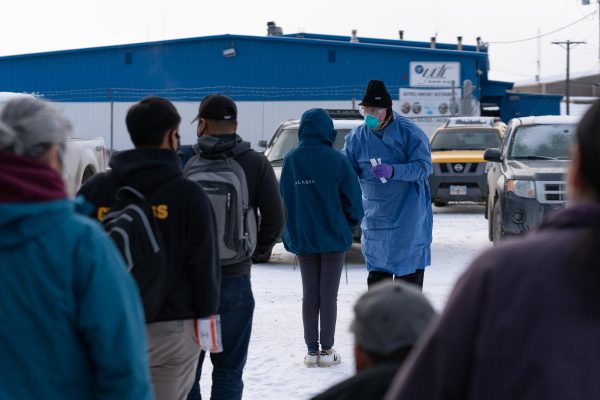
On Oct. 29, Bethel Mayor Michelle DeWitt spoke with Gov. Mike Dunleavy, asking the state to take more actions to combat the COVID-19 pandemic. One of the mayor’s requests was to extend the state’s emergency disaster declaration because its expiration could affect Bethel’s authority to mandate testing at its airport.
DeWitt said that the governor reached out to her to talk about in-state travel to rural communities during the COVID-19 pandemic. She said that she was unsure why the governor wanted to talk about this subject now.
“Because for us and our situation, the time where restrictions or testing or any of those kinds of approaches would have been most helpful would have been a few months ago,” DeWitt said.
Read more coverage of how the coronavirus affects rural Alaska
The mayor informed Dunleavy and members of his administration about the Y-K Delta’s struggles to contain the pandemic. The Y-K Delta’s COVID-19 infection rates are the highest in the state, more than double that of the Anchorage region, which has the second highest. She told the governor about how Bethel tried to limit the spread of the virus by passing a face mask mandate and an airport testing mandate at the end of August.
“I also shared that a state mandate would have been, or are, essential to the public health of our citizens,” DeWitt said. “And while the city did adopt these, it was because the state of Alaska had not, and we felt we needed to act.”
But the future of Bethel’s facemask and airport testing mandates may become uncertain. That’s because the state’s emergency disaster declaration for the COVID-19 pandemic is scheduled to expire on Nov. 15.
City Attorney Elizabeth “Libby” Bakalar said that the state’s disaster declaration was one of the pillars that supported the city’s authority to enact its mandates.
“So if the statewide emergency goes away, we are going to have to take a closer look at our individual powers,” Bakalar said. “And I certainly think when we don’t have the power of the state behind us, it makes our jobs more difficult.”
Bakalar said that without the backing of the state’s emergency declaration, she and the city council would have to re-evaluate if the city has the power, on its own, to enact the mandates. If the state’s declaration expires, she said that at the very least, the mandates would have to be rewritten so that they don’t refer to the state’s declaration.
As of now, Bethel’s police officers are not actively enforcing the city’s airport testing or face mask mandates, but Bethel City Clerk Lori Strickler believes that they are still making a difference.
“I have had a number of contractors reach out to me and to the city and say, ‘Hey, you know, I just found out about this mandate; I want to make sure that we’re in compliance. What do we need to do?’” Strickler said.
In speaking with the governor, DeWitt requested that he do what he could to extend the state’s emergency declaration.
“That is very important,” DeWitt emphasized.
DeWitt also suggested that the state consider targeted closures of businesses and gathering places in areas that are currently coronavirus hotspots, like Bethel. And she said that the state should require passengers test for COVID-19 at the Anchorage airport before traveling to Bethel or other rural communities. She said that the governor and his staff expressed interest in that idea, asking DeWitt how the city was currently incentivizing and enforcing compliance for airport testing on the Bethel end.




